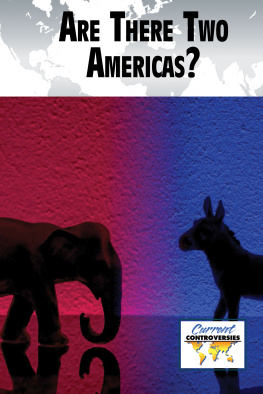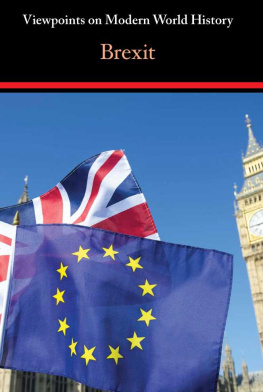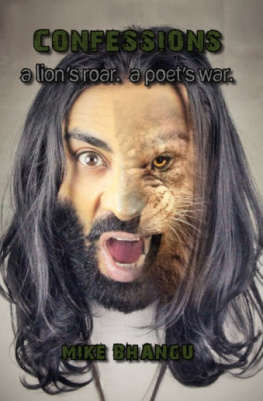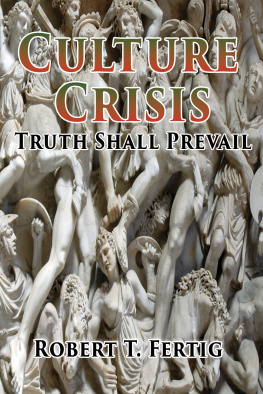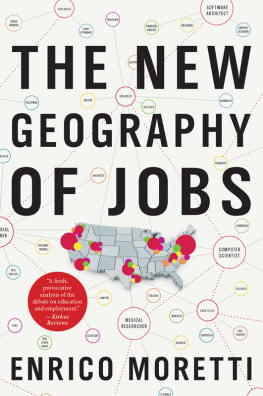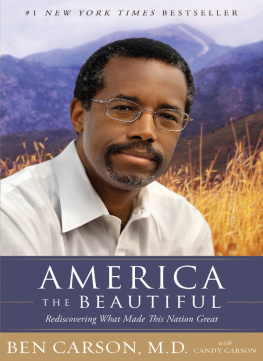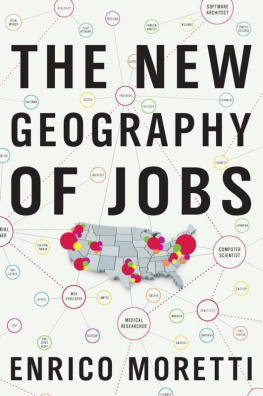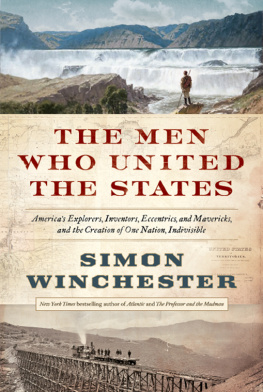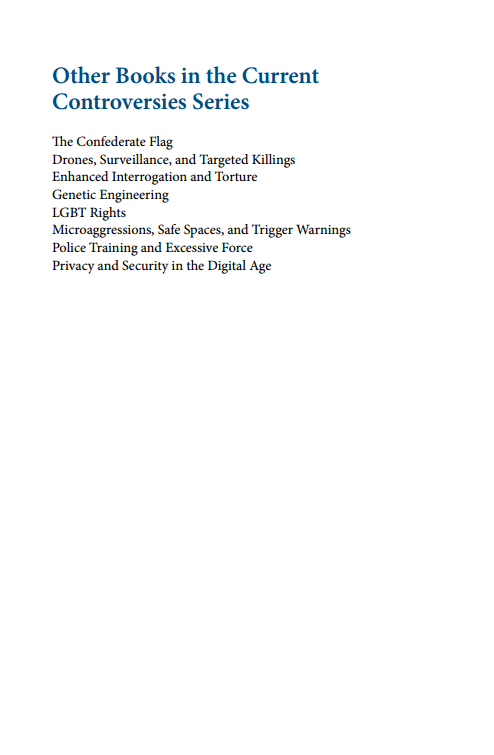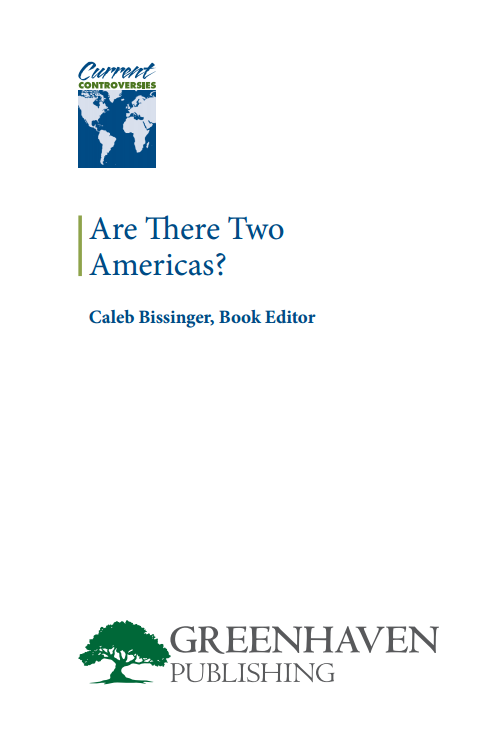Published in 2018 by Greenhaven Publishing, LLC
353 3rd Avenue, Suite 255, New York, NY 10010
Copyright 2018 by Greenhaven Publishing, LLC First Edition
All rights reserved. No part of this book may be reproduced in any form without permission in writing from the publisher, except by a reviewer.
Articles in Greenhaven Publishing anthologies are often edited for length to meet page requirements. In addition, original titles of these works are changed to clearly present the main thesis and to explicitly indicate the authors opinion. Every effort is made to ensure that Greenhaven Publishing accurately reflects the original intent of the authors. Every effort has been made to trace the owners of the copyrighted material.
Cover image: Victor Moussa/Shutterstock.com; maps adapted from Malachy666/Shutterstock.com.
Cataloging-in-Publication Data
Names: Bissinger, Caleb, editor.
Title: Are there two Americas? / edited by Caleb Bissinger.
Description: New York : Greenhaven Publishing, 2018. | Series: Current controversies | Includes bibliographical references and index. | Audience: Grades 9-12.
Identifiers: LCCN ISBN 9781534502338 (library bound) | ISBN 9781534502390 (pbk.) Subjects: LCSH: Equality--United States--Juvenile literature. | Segregation--United States--Juvenile literature. | Discrimination--United States--Juvenile literature.
| Civil rights--United States--Juvenile literature. | Prejudices--United States--Juvenile literature. | United States--Social conditions--Juvenile literature.
Classification: LCC HM821.A74 2018 | DDC 305.800973--dc23
Manufactured in the United States of America Website: http://greenhavenpublishing.com
Contents
Richard White
The late nineteenth century was a period of massive change in America as the nation reunified after the Civil War, expanded west, grew more urban, and saw a surge in immigration and industrialization.
Yes: The nation is divided, and you can thank history and geography
David Morris
The Thirteenth Amendment ended slavery, but African Americans faced great inequities throughout the twentieth century and today confront racially biased voting restrictions and mass incarceration.
Brian Thiede, Steven Beda, Lillie Greiman, et al
Rural areas are poorer than their urban counterparts and have slowerjob growth, but they are also entrepreneurial.
Raza Rumi
The urban-rural divide had a decisive role in the 2016 presidentialelection, as urban voters tended to support Hillary Clinton and ruralvoters tended to support Donald Trump
No: There is more that unites the nation than divides it
Courtney Martin
As urbanites are moving back to rural areas, those areas arebecoming more diverse and entrepreneurial.
David Korten
Regardless of region, Americans share many of the same economicand personal ambitions.
Jon Kofas
American history is full of political, cultural, racial, and religiousclashes.
Yes: Popular culture can bridge divides and inspirenational unity
Justice B. Hill
In 1947, Jackie Robinson became the first black man to play in the MLB, and it had a profound impact on race relations in the United States.
William McKenzie and Talmage Boston
Baseball is a model of diversity, equal rights, technological sophistication, and competition.
No: Popular culture cant fix our divisions, and sometimes it makes them worse
Sanford Jay Rosen
The integration of baseball moved race relations forward, but racial bigotry and structural inequality are still to be found in this nation.
American Yawp
Television can change our hearts and minds, but it can also reinforceproblematic assumptions about family and gender.
Ruby Hamad
Women of color are marginalized and underrepresented on television and in films as the benefits of feminism have left them out.
Stephanie A. Martin and Christopher Salinas
Then Republican candidate Donald Trumps polarizing comments about the 2016 Pulse massacre in Orlando illustrate how tragedy can both inspire unity and foster hate.
Yes: National tragedies unite the nation
Ariel Gros-Werter
Tragedy brings people together and strengthens their sense of community.
Doug Bernard
Following national tragedies, social media can be a profound platform for grieving, empathy, and inspiration, though it can also confirm biases and reinforce existing beliefs
No: National tragedies do not unite the nation, they pull it apart
Margaret Wente
The aftermath of the 2016 attack in Orlando didnt bring the nationtogether. Instead, it led to bitter disagreement between people on either side of the political spectrum.
Eyes on the Right
White nationalistsgroups that espouse white supremacyused the Orlando massacre as an opportunity to attack the LGBT and Muslim communities.
John W. Whitehead
It is sometimes said that America is now a post-racial society, but the author notes there are still racial biases in our criminal justice and voting systems.
Nick OMalley
The 2016 presidential election must be understood through the lenses of race and class.
Yes: The 2016 election tore the nation apart
Mary Kay Magistad
Trumps election ushered in a new era of mistrust that threatens to undermine democracy.
Pew Research Center
A survey of thousands of adults finds that the nation is more politically divided than ever, as scores of Americans believe the opposing political party is a threat to the countrys well-being.
No: The election may have been divisive, but the nation can still unite
Jeff Singh
By focusing on people not politics, it is still possible for the nation tocome together after a fractious election.
Charles Eisenstein
In times of great struggle and division, its important to fight the urgeto hate and to commit to changing vocabulary and writing a newnarrative.
Foreword
C ontroversy is a word that has an undeniably unpleasant connotation. It carries a definite negative charge. Controversy can spoil family gatherings, spread a chill around classroom and campus discussion, inflame public discourse, open raw civic wounds, and lead to the ouster of public officials. We often feel that controversy is almost akin to bad manners, a rude and shocking eruption of that which must not be spoken or thought of in polite, tightly guarded society. To avoid controversy, to quell controversy, is often seen as a public good, a victory for etiquette, perhaps even a moral or ethical imperative.
Yet the studious, deliberate avoidance of controversy is also a whitewashing, a denial, a death threat to democracy. It is a false sterilizing and sanitizing and superficial ordering of the messy, ragged, chaotic, at times ugly processes by which a healthy democracy identifies and confronts challenges, engages in passionate debate about appropriate approaches and solutions, and arrives at something like a consensus and a broadly accepted and supported way forward. Controversy is the megaphone, the speakers corner, the public square through which the citizenry finds and uses its voice. Controversy is the lifes blood of our democracy and absolutely essential to the vibrant health of our society.

